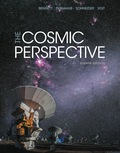
Comparative Planetology. Roles: Scribe (takes notes on the group’s activities), Proposer (proposes explanations to the group), Skeptic (points out weaknesses in proposed explanations), Moderator (leads group discussion and makes sure everyone contributes). Activity: This chapter advocates learning about how planets work by comparing the planets in general, as opposed to studying the individual planets in great depth. Compare this approach with any previous study you might have made of the planets—for example, in grade school or an earth sciences class—by making a list of advantages and any disadvantages of the comparative approach. Then describe in a few sentences how a comparative approach might be used in a completely different field, such as another branch of science or social science.
Want to see the full answer?
Check out a sample textbook solution
Chapter 7 Solutions
EBK COSMIC PERSPECTIVE, THE

 AstronomyPhysicsISBN:9781938168284Author:Andrew Fraknoi; David Morrison; Sidney C. WolffPublisher:OpenStax
AstronomyPhysicsISBN:9781938168284Author:Andrew Fraknoi; David Morrison; Sidney C. WolffPublisher:OpenStax An Introduction to Physical SciencePhysicsISBN:9781305079137Author:James Shipman, Jerry D. Wilson, Charles A. Higgins, Omar TorresPublisher:Cengage Learning
An Introduction to Physical SciencePhysicsISBN:9781305079137Author:James Shipman, Jerry D. Wilson, Charles A. Higgins, Omar TorresPublisher:Cengage Learning Horizons: Exploring the Universe (MindTap Course ...PhysicsISBN:9781305960961Author:Michael A. Seeds, Dana BackmanPublisher:Cengage Learning
Horizons: Exploring the Universe (MindTap Course ...PhysicsISBN:9781305960961Author:Michael A. Seeds, Dana BackmanPublisher:Cengage Learning Glencoe Physics: Principles and Problems, Student...PhysicsISBN:9780078807213Author:Paul W. ZitzewitzPublisher:Glencoe/McGraw-Hill
Glencoe Physics: Principles and Problems, Student...PhysicsISBN:9780078807213Author:Paul W. ZitzewitzPublisher:Glencoe/McGraw-Hill Stars and Galaxies (MindTap Course List)PhysicsISBN:9781337399944Author:Michael A. SeedsPublisher:Cengage Learning
Stars and Galaxies (MindTap Course List)PhysicsISBN:9781337399944Author:Michael A. SeedsPublisher:Cengage Learning





